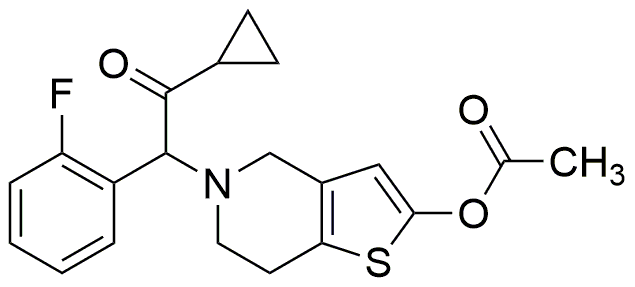Prasugrel is widely utilized in research focused on
- Cardiovascular Medicine: Primarily used as an antiplatelet medication, it helps prevent blood clots in patients undergoing procedures like angioplasty. This is crucial for reducing the risk of heart attacks and strokes.
- Clinical Trials: Frequently involved in clinical studies assessing its effectiveness compared to other antiplatelet agents, providing valuable data for healthcare professionals to make informed decisions.
- Pharmaceutical Development: Used in the formulation of new drug combinations aimed at enhancing patient outcomes in cardiovascular therapies, showcasing its versatility in treatment plans.
- Patient Management: Helps in managing patients with acute coronary syndrome, offering a reliable option for those who may not respond well to other medications.
- Research on Drug Interactions: Investigated for its interactions with other medications, aiding researchers in understanding its safety profile and optimizing treatment regimens for patients.
General Information
Properties
Safety and Regulations
Applications
Prasugrel is widely utilized in research focused on
- Cardiovascular Medicine: Primarily used as an antiplatelet medication, it helps prevent blood clots in patients undergoing procedures like angioplasty. This is crucial for reducing the risk of heart attacks and strokes.
- Clinical Trials: Frequently involved in clinical studies assessing its effectiveness compared to other antiplatelet agents, providing valuable data for healthcare professionals to make informed decisions.
- Pharmaceutical Development: Used in the formulation of new drug combinations aimed at enhancing patient outcomes in cardiovascular therapies, showcasing its versatility in treatment plans.
- Patient Management: Helps in managing patients with acute coronary syndrome, offering a reliable option for those who may not respond well to other medications.
- Research on Drug Interactions: Investigated for its interactions with other medications, aiding researchers in understanding its safety profile and optimizing treatment regimens for patients.
Documents
Safety Data Sheets (SDS)
The SDS provides comprehensive safety information on handling, storage, and disposal of the product.
Product Specification (PS)
The PS provides a comprehensive breakdown of the product’s properties, including chemical composition, physical state, purity, and storage requirements. It also details acceptable quality ranges and the product's intended applications.
Certificates of Analysis (COA)
Search for Certificates of Analysis (COA) by entering the products Lot Number. Lot and Batch Numbers can be found on a product’s label following the words ‘Lot’ or ‘Batch’.
Numéro de catalogue
Numéro de lot/série
Certificates Of Origin (COO)
This COO confirms the country where the product was manufactured, and also details the materials and components used in it and whether it is derived from natural, synthetic, or other specific sources. This certificate may be required for customs, trade, and regulatory compliance.
Numéro de catalogue
Numéro de lot/série
Safety Data Sheets (SDS)
The SDS provides comprehensive safety information on handling, storage, and disposal of the product.
DownloadProduct Specification (PS)
The PS provides a comprehensive breakdown of the product’s properties, including chemical composition, physical state, purity, and storage requirements. It also details acceptable quality ranges and the product's intended applications.
DownloadCertificates of Analysis (COA)
Search for Certificates of Analysis (COA) by entering the products Lot Number. Lot and Batch Numbers can be found on a product’s label following the words ‘Lot’ or ‘Batch’.
Numéro de catalogue
Numéro de lot/série
Certificates Of Origin (COO)
This COO confirms the country where the product was manufactured, and also details the materials and components used in it and whether it is derived from natural, synthetic, or other specific sources. This certificate may be required for customs, trade, and regulatory compliance.


